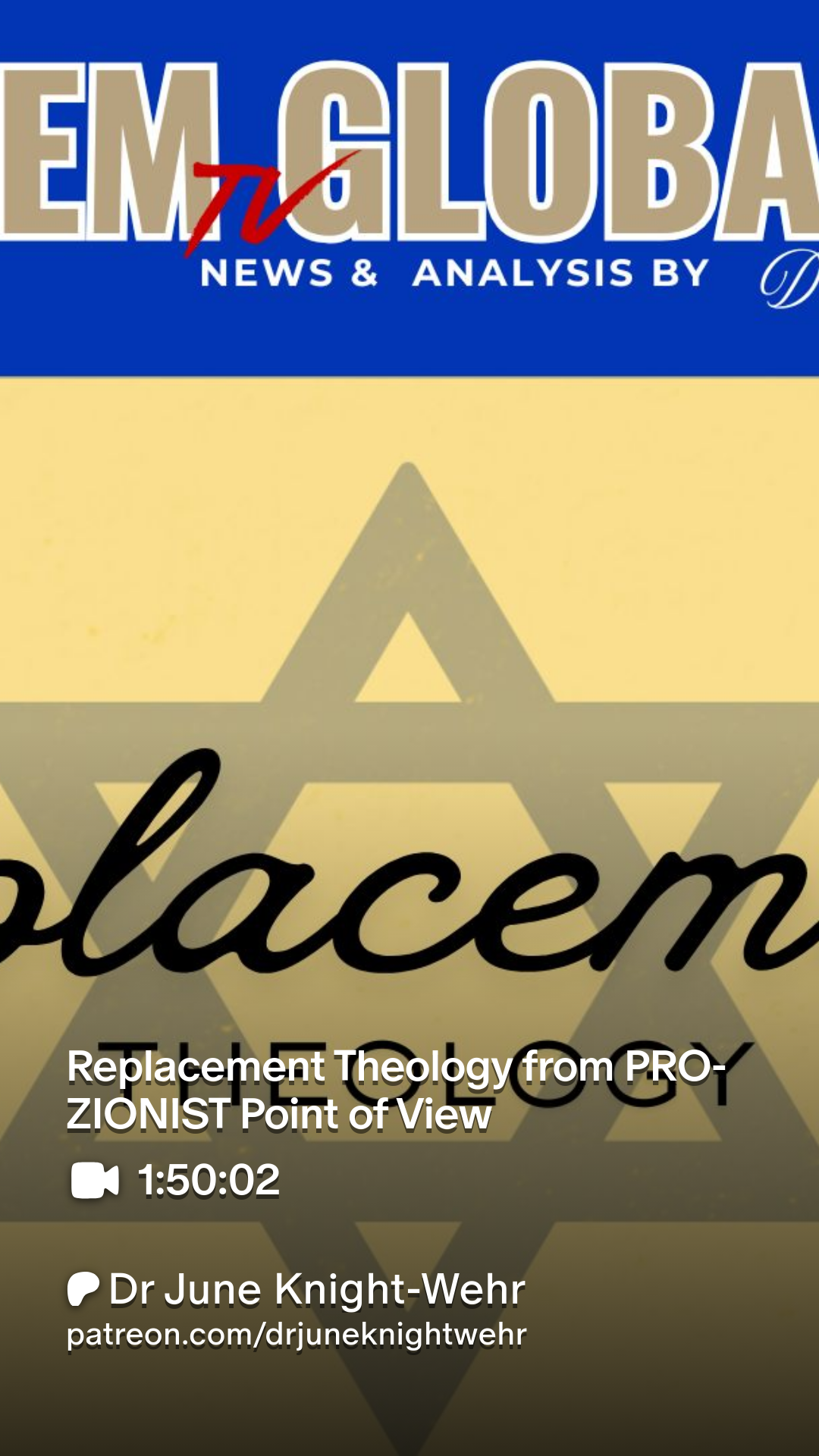
WATCH DR. JUNE'S NEWS
Dr. June is tackling this hot issue today because this is going to be the main tool the enemy uses to attack the church through antisemitism laws they are creating. They're obviously not targeting true haters of Jews and Israel (the Muslims - based on their Quran teachings)...but the Christians! (Real Christians - not Catholics! They are after the Remnant church). Today we are presenting from the Zionist and Jewish perspective of what is REPLACEMENT THEOLOGY. This is only their perspective today.
LINKS
See below .pdf by Liberty University about their position on WHAT IS REPLACEMENT THEOLOGY.
WHAT IS REPLACEMENT THEOLOGY?
Replacement theology, or supersessionism, is the belief that the Christian Church has replaced the Jewish people as God's chosen people. This doctrine holds that God's covenant promises to Israel were fulfilled in the Church, meaning there are no longer specific future plans for the nation of Israel. It is a controversial topic with varying interpretations, some of which suggest the doctrine has historically contributed to antisemitism.
Core beliefs
-
The Christian Church has superseded Israel in God's plan and covenant.
-
The Jews are no longer God's chosen people.
-
God does not have distinct, future plans for the nation of Israel.
-
Biblical promises made to Israel have been fulfilled in the Church, not in the nation of Israel.
Contrasting viewpoints
-
Supersessionism vs. dispensationalism: Replacement theology differs from dispensationalism, a viewpoint that holds that God interacts with different groups of people in different ways throughout different eras.
-
Fulfillment vs. replacement: Some proponents, who prefer the term "fulfillment theology," argue that the Church is not a replacement but rather a fulfillment of God's plan, which includes believing Jews and Gentiles together as the new "one body" in Christ.
-
Abolishment of the covenant: Replacement theology often rests on the idea that the Abrahamic Covenant has been abolished, while other interpretations maintain that the covenant remains in effect.
Historical context and controversy
-
Some scholars and critics argue that replacement theology is based on a selective interpretation of scripture and has fueled antisemitic sentiments throughout history, with its influence potentially leading to atrocities against Jewish people, such as the Holocaust.
-
The doctrine has been present in Christian tradition for many centuries.
-
The controversy surrounding this theology continues, with differing opinions on its validity and its ethical and theological implication
Has the Church Replaced Israel? A Biblical Response
Catholic Position -
Question:
Answer:
Replacement Theology essentially claims that the Jewish people were the chosen people of God and that due to their rejection of the Christ they have been replaced as God’s chosen people by the Church. This replacement is then taken to mean that the Jewish people have been rejected or “accursed” by God for their rejection of the Gospel.
Is replacement theology anti-Semitic?
Replacement Theology: Clueless or Complicit?
CBN - Israel ‘Replacement Theology’ Controversy Goes Mainstream
Survey: Younger Evangelicals Rejecting Israel’s Biblical Role: Replacement Theology Making a Comeback
The Challenge of Replacement Theology
CUFI - THE DANGEROUS DOCTRINE OF REPLACEMENT THEOLOGY (see .pdf below as well)
What is replacement theology / supersessionism / fulfillment theology?
Does Anyone Actually Believe in Replacement Theology?
FROM - INTERNATIONAL CHRISTIAN EMBASSY JERUSALEM - Replacement Theology: What It Is and Why It Matters for Christians
TORAH RESOURCE LIBRARY - One Law Theology – Is it Just Replacement Theology?
Supersessionism
Supersessionism, also called fulfillment theology by its proponents,[1] and replacement theology[1] by its detractors, is the Christian doctrine that the Christian Church has superseded the Jewish people, assuming their role as God's covenanted people,[2] thus asserting that the New Covenant through Jesus Christ has superseded or replaced the Mosaic covenant. Supersessionists hold that the universal Church has become God's "New Israel" and thus Christians are the people of God.[3][4][5]
Often claimed by later Christians to have originated with Paul the Apostle in the New Testament, supersessionism has formed a core tenet of many Eastern Orthodox churches, Roman Catholic and Lutheran churches for the majority of their history.[6] Many early Church Fathers—including Justin Martyr and Augustine of Hippo—were supersessionist
CAN MUSLIMS BE ANTISEMITIC?
Muslims, as individuals and as a community, demonstrate non-antisemitic attitudes through theological recognition of Jews as "People of the Book," a history of peaceful coexistence and intellectual exchange, and modern interfaith initiatives.
Theological Basis for Respect
-
Shared Abrahamic Roots: Judaism and Islam are both Abrahamic religions, and Muslims are required to believe in and revere many of the same prophets, including Abraham and Moses.
-
"People of the Book": Islamic theology grants Jews (and Christians) the special status of Ahl al-Kitab ("People of the Book"), who are protected under Islamic law (dhimmi status) and generally allowed freedom of religion in Muslim-majority lands.
-
Mutual Respect Mandated: The Quran and other Islamic texts contain verses that promote a vision of religious pluralism and mutual respect across religious lines.
Historical Coexistence and Contribution
-
Islamic Golden Age: Historically, particularly during the Islamic Golden Age in places like Al-Andalus (Muslim Spain) and Baghdad, Jews and Muslims lived in relative harmony. Jewish communities flourished, with individuals holding significant positions in government, commerce, medicine, and philosophy, interacting and contributing to the broader Muslim society.
-
Contrast with Christendom: In many periods, the treatment of Jews under Muslim rule was better than under Christian rule, where they often faced worse persecution and massacres.
-
Modern Examples: Historically, cases of cooperation, tolerance, and mutual dependency were common. In modern times, examples of Muslim solidarity with Jewish communities, such as protecting synagogues or engaging in interfaith dialogue, continue to occur in various parts of the world.
Distinguishing Anti-Zionism from Antisemitism
-
A crucial point in contemporary discussions is the distinction between opposition to the policies of the Israeli government (anti-Zionism) and hatred of Jews as a people (antisemitism). Many Muslims who take issue with the Israeli government's actions maintain respect for Jewish people and Judaism as a faith.
-
The spread of modern, racialized antisemitism among some Muslims is often attributed to the influence of 19th and 20th-century European antisemitic ideologies and political conflicts, rather than being an inherent or universal aspect of Islamic theology or history.


